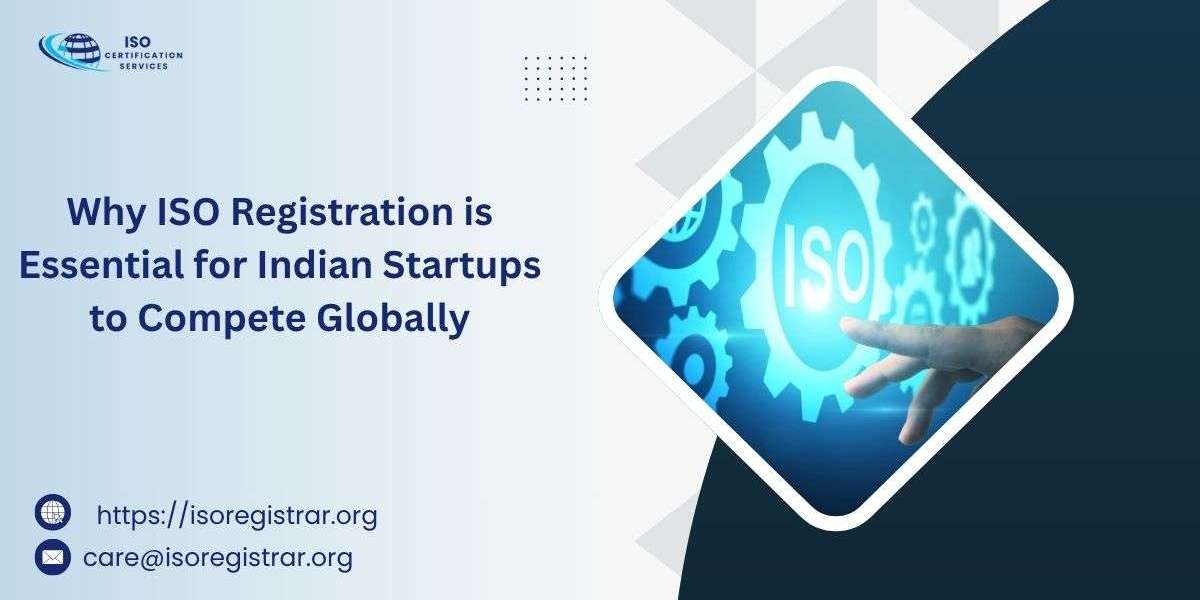Introduction
India is home to over 90,000 DPIIT-recognized startups, and the number is growing each day. These startups operate across diverse industries, from agritech and fintech to AI, renewable energy, and deep tech. As competition intensifies, Indian startups not only need funding and innovation but also global credibility.
One of the most powerful and often overlooked ways to gain that credibility is through ISO registration. While traditionally seen as a certification for large industries and exporters, ISO standards are now crucial for startups, especially those looking to scale, export, or attract foreign clients.
This article dives deep into why ISO registration is a game-changer for Indian startups, how it impacts global competitiveness, and how to get ISO certified easily.
What is ISO Registration?
ISO stands for the International Organization for Standardization, an independent, non-governmental international body that develops standards to ensure the quality, safety, and efficiency of products, services, and systems.
An ISO registration or certification means your business complies with internationally recognized quality or management standards, such as ISO 9001 (Quality Management) or ISO 27001 (Information Security).
Why Should Startups Bother About ISO Certification?
Here’s why ISO registration is not just for big businesses:
Builds Global Trust
When you're pitching to overseas clients or investors, having ISO certification shows that your processes meet global standards. It eliminates doubts about quality or security.
Gives You a Competitive Edge
If you're bidding for a corporate or government contract, ISO is often a basic eligibility requirement. Without it, you're out of the race.
Streamlines Internal Processes
Startups often operate in chaos. ISO standards force you to create process-driven systems, making your business more organized and scalable.
Helps with Investor Confidence
VCs and institutional investors prefer startups with compliance readiness. ISO certification sends the message: "We are ready to grow."
Unlocks International Markets
Planning to export a product or offer SaaS abroad? ISO certification is often needed to enter EU, US, and Middle Eastern markets.
Which ISO Standards Are Relevant to Startups?
There are more than 22,000 ISO standards, but not all apply to startups. Here are some high-impact ISO standards for Indian startups across sectors:
ISO 9001 – Quality Management System
- Ensures your products or services meet quality expectations
- Builds customer trust
- Suitable for almost all startups
ISO 27001 – Information Security Management
- Protects data and customer information
- Crucial for IT, SaaS, fintech, and edtech startups
- Helps meet global data privacy regulations
ISO 14001 – Environmental Management System
- Focuses on eco-friendly operations
- Ideal for green-tech, waste management, or sustainable startups
ISO 45001 – Occupational Health and Safety
- Keeps your employees safe
- Great for manufacturing, logistics, and agri-tech startups
ISO 22000 – Food Safety Management
- Ensures safe food production and handling
- Best for food processing, cloud kitchens, and food delivery startups
ISO 13485 – Quality for Medical Devices
- Ensures your health tech products meet international standards
- Vital for medtech and biotech startups
ISO 50001 – Energy Management System
- Helps manage and reduce energy use
- Good for startups in renewable energy or energy-saving products
How to Get ISO Registration in India – Step-by-Step Guide for Startups
Here’s a simplified guide for Indian startups:
- Choose the Right ISO Standard: Select the ISO standard that fits your business needs and aligns with your goals.
- Visit the Certification Portal: Go to the official ISO certification website.
- Fill Out the Application Form: Complete the online form, ensuring all details are accurate.
- Submit Your Application: Review, submit, and double-check all details.
- Payment: After submitting the form, pay the nominal charges.
- Certificate Confirmation: A consultant confirms the ISO standard you're applying for.
- Receive Your ISO Certificate: Once it’s approved, your ISO certificate will be sent to your registered email.
Documents Required for ISO Certification
Here’s a quick checklist:
- PAN Card and Aadhaar of founder/director
- Business registration proof (GST, Udyam, etc.)
- Address proof
- Scope of business activities
- Process flow chart (for some standards)
- Quality manual or IT policy document (depending on ISO type)
Validity and Renewal of ISO Certificate
- Usually valid for 3 years
- Needs annual surveillance audit
- Must be renewed before expiry to avoid penalty or compliance issues
- In case of major internal changes (like product line or scale), update ISO documentation
ISO Certification for Startup India Registered Ventures
Startups registered under Startup India can benefit from:
- Reimbursement of ISO Certification Cost by State Governments
- Faster recognition for export schemes
- Eligibility for global accelerator programs
Check if your state (like Maharashtra, Gujarat, Telangana) offers ISO cost subsidy schemes for startups.
NOTE:- Apply for ISO CERTIFICATION 9001 : 2015
Conclusion
For Indian startups aiming to compete on a global stage, ISO certification is no longer a luxury, it’s a necessity. It brings structure to innovation, helps you win trust beyond borders, and aligns your operations with world-class standards.
Whether you're building software, exporting handicrafts, running a medtech platform, or managing a green energy startup, ISO registration can elevate your journey.
If you're serious about growth, quality, and scalability, getting ISO certified should be part of your core strategy, not just a checklist item.



